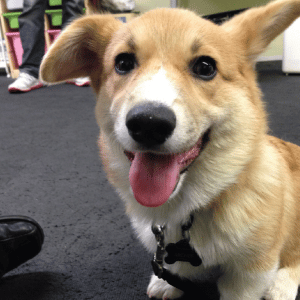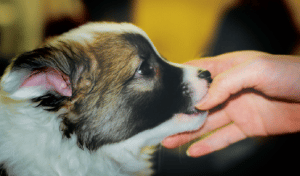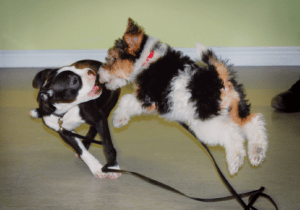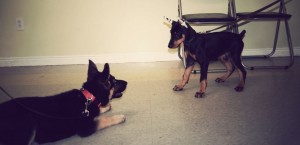Congratulations on your new addition!
Bringing home a new puppy is a big event and it’s your job to raise them to be confident and successful in the world. Having helped over 12,000 dogs (and their owners) since 2010, we’ve been asked a lot of questions from new puppy owners over the years.
Here are answers to the top 5 questions we’re asked:
How do I teach my puppy to eliminate outside?

- Exuberant activity
- Drinking water
- Waking up
- Eating food
If you can’t supervise your puppy directly, confine them so your puppy can’t wander throughout your home and have accidents. If your puppy does have an accident, stay calm, wait for them to finish and take them outside to ensure they don’t have to go anymore.
Do not punish your puppy! Punishing your puppy for accidents will scare them from eliminating while you are watching, which includes outdoors.
What do I do if my puppy cries when left alone?
You should avoid rushing back to your puppy if they cry when left alone, but it’s better to go slowly so they don’t cry at all. Get your puppy used to being alone by confining them briefly when you are still at home so they are calm while being physically separated from you.
Create a “safe place” for your puppy like a crate, exercise pen, or baby-gated area of your home
Put them in their safe place with something good to eat like a kong with wet food or a favourite chew item.
Once they’re busy with their item, try short departures from them. Answer emails, put on the laundry, or other chores around the house to help build your puppy’s confidence at being separated from you. These short departures set them up to succeed when you actually leave the house.
Ouch! How do I get my puppy to stop biting me?

your hands. It’s normal for puppies to nip, and later, as their puppy teeth fall out, they will stop nipping altogether.
How do I teach my puppy to walk nicely on a leash?
Praise and treat your puppy whenever they are walking nicely with you. Puppies need to be taught
how to walk on a leash and may frequently refuse to move. If your puppy tends to freeze, return to their side and encourage them to come with you instead of pulling them along. You may also pick them up, walk a few steps, and put them down again. Most puppies improve quickly.
When should I start training my puppy?

Why Choose When Hounds Fly?
Start ANY time – We accept new students at any time, so you can start socializing your new puppy right away.
Flexible Schedules – Puppy Start Right classes are scheduled multiple days and times a week – mix and match classes for greater flexibility.
Convenient Locations – Puppy Start Right classes are held at all of our locations!
Outstanding Training and Effective Results – Our method (clicker training) is safe for all family members, strengthens (not damages) your relationship with your dog, and is scientifically proven to be the most effective.
Top Instructors – All instructors are Karen Pryor Academy Certified Training Partners, or have their CPDT-KA designation.
About When Hounds Fly Puppy Start Right Classes:
This class is for prepared puppy owners that planned ahead and understand that the critical socialization period of a puppy is between 8 to 16 weeks. They know that during this developmental period, carefully implemented socialization experiences towards people, other dogs, and the sights and sounds of urban living will significantly reduce the likelihood of fear, anxiety, and aggression issues arising later in life. These owners understand that prior to complete vaccination, their puppy needs to have a rich socialization history and that a well-run puppy socialization class is a key component of that. This class is designed for these owners and their puppies.
Each class will consist of three components – 1) Structured, supervised, and healthy socialization opportunities, both on and off-leash for the puppies in the classroom 2) Weekly socialization topics and best-practice advice and practical exercises 3) Very basic clicker training exercises.

